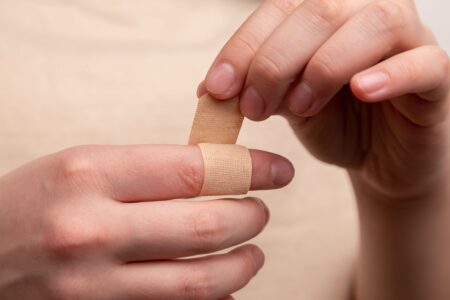First Aid Tips for Minor Injuries- Cuts and Scrapes
Every single day, minor injuries happen either to us or to someone around us. It might be a slight cut to the fingers, a scald or burn, a scrape from a fall, or maybe a spider bite. Many people don’t really know how to provide first aid care for minor injuries. Luckily, in this post we’ll discuss the first aid tips for minor injuries. Use these tips relieve pain, prevent wound infection, and to ensure a much faster healing.

First Aid for Minor Skin Cuts and Scrapes
Skin cuts and scrapes are very common types of minor injuries. Typical causes of these injuries include falls, scratches, light hits, etc. Whatever the cause of the injury, follow these first aid steps to manage it effectively.
i. Clean your hands
Before you begin managing minor injuries, you should clean your hands to avoid contaminating the wound. To do that, use water and soap or simply use a sanitizing agent. If you’re not in a position to wash your hands, then be sure t have your surgical gloves on.
Quick Read: Chemotherapy overview
ii. Apply pressure to stop bleeding
After cleaning your hands and wearing your surgical gloves, if you have them that is, the next step is to stop any further blood loss from the cut or bruise. Do that by gently applying pressure on the wound using a gauze, bandage, or clean piece of cloth. You may want to elevate the wound a little bit to enhance the process of clotting. There’s no definite time span for applying pressure on the wound, but normally the procedure lasts about 10 to 15 minutes.
iii. Wash the wound with water and soap
Once the bleeding has stopped, it’s time to clean the wound. Do this with cold water and soap. If the cut has some form of debris such as soil, grass, etc. use a pair of tweezers to remove them.
Tip!
For fresh open wounds, do not use iodine or hydrogen peroxide while cleaning as that may lead to skin irritation.
Apply some ointment of petroleum jelly
After cleaning the wound, you may want to apply some antibiotic ointment on it to prevent infections. To soften the wound and prevent the formation of scars, you may choose to apply petroleum jelly. Though using petroleum jelly can decrease chances of scar formation, it may also slow down the healing process.
Quick Read: Best anti-dundruff oils for men and women
iv. Leave the wound open
Minor injuries such as scrapes and scratches are best left open to dry and heal quickly. However, if the wound is attracting flies or is at risk of contamination with dirt, you may want to dress it with a bandage or some rolled gauze. Remember to change the dressing routinely to avoid any risk of secondary infection.
v. Seek further medical assistance
Minor injuries often resolve in a few days. However, some may take longer than usual to heal, especially if these is a secondary infection or some other complications that may be interfering with the healing process. As such, you may want to see a doctor if you experience signs such as increased pain, intense warmth, or significant swelling.
How to prevent skin scarring after would healing
When minor or major injuries heal, a scar might be left behind sometimes. While some scars are small and unnoticeable, others are much larger and very conspicuous. Here are some quick tips to prevent a scar forming:
Also Read:
Quick Read: Best Anti-Aging Supplements
If you don’t want to end up with scars, then you need to avoid injuries. Do that by wearing protective gears on vulnerable areas of the body. Wear a helmet on the head, hand gloves, knee pads, etc.
a). Seek medical treatment for deep wounds
While first aid for minor wounds may be sufficient for treating some considerably deep cuts, further treatment from a doctor might be needed to prevent the formation of scar tissue.
b). Apply petroleum jelly or antibiotic ointment
Another quick way to prevent wound scarification is by applying petroleum jelly or an antibiotic ointment. Note however that this may slow the healing process significantly.
c) Do not pick dry solid clot on the wound (scrab)
There’s the temptation to always want to pick the scab that forms on the healing wound. Try hard to resist it or else you’ll not only slow down the healing process but also increase chances of ending up with a big scar.
d). Do not bandage minor wounds
Bandaging is normally recommended for deep cuts. Minor wounds are best left open to air dry and heal quickly.
e). Use concealment creams if necessary
If the would healed but left some conspicuous scar that’s bothering you a lot, consider using a concealment cream. Your doctor will be able to advice on the best creams for you.
Also Read: Top 10 Best Beard Oils






















